To recognize and support the development of outstanding mid-career physician leaders.
Important Dates
Deadline for submission
Announcement of Richard L. Byyny Fellow in Leadership awardees

2025 AΩA Fellow in Leadership
Alpha Omega Alpha Honor Medical Society (AΩA) is pleased to announce four 2025 Fellows in Leadership, with a special thank you to the Kern National Network for Flourishing in Medicine (KNN) for sponsoring a Fellow for the 2025-2026 program cycle, in a collaboration that will advance leadership development efforts that encourage excellence, a spirit of service and a human-centered approach.
The 2025 Fellows are:
Susan Ball, MD, MPH, MS, KNN Fellow in Leadership (AΩA, City University of New York School of Medicine, 2025, Faculty), is Clinical Professor at the City University of New York (CUNY) School of Medicine, and Professor Emeritus at Weill Cornell Medicine. She has spent more than 20 years caring for patients with HIV in New York City, spending most of her time caring for patients in the clinical setting. Ball graduated from Dartmouth College with a degree in Art History in 1981. She matriculated to Universite Catholique de Lille, Faculte de Medecine (Loos, France), then transferred to the Medical College of Pennsylvania where she earned her MD. After completing her Internal Medicine residency at the State University of New York Upstate Medical Center, she earned a Master of Public Health (MPH) degree at the Columbia University Mailman School of Public Health. Dr. Ball also holds a Master of Science in Narrative Medicine from Columbia University, which she completed in 2011.
Nicole Christian, MD, MSCS, FACS (AΩA, University of Colorado School of Medicine, 2011), is Associate Professor, Surgery-Surgical Oncology, the University of Colorado School of Medicine, and Breast Surgical Oncology, University of Colorado Diane O’Connor Thompson Breast Center. She received an undergraduate degree in History of Science from Harvard University in 2007, and her medical degree from the University of Colorado School of Medicine in 2011. She completed a fellowship in breast surgical oncology at Memorial Sloan Kettering Cancer Center in New York.
Angelike Liappis, MD (AΩA, George Washington University School of medicine and Health Sciences, 1999), is an Infectious Diseases physician and serves as Medical Director of the Antimicrobial Stewardship Program at Veterans Affairs Medical Center, Washington, DC. She holds an academic appointment as Professor in Department of Medicine and Department of Microbiology, Immunology, and Tropical Medicine, George Washington University School of Medicine and serves as Councilor, George Washington University Chapter of Alpha Omega Alpha Honor Medical Society. Dr. Liappis received her medical degree from George Washington University School of Medicine. She is a Fellow of the Infectious Diseases Society of America.
David Caba Molina, MD, MS, MPH (AΩA, Loma Linda University School of Medicine, 2023, Faculty) is Division Chief of Surgical Oncology, Riverside University Health System, and Associate Program Director, Complex General Surgical Oncology Fellowship, Loma Linda University. As chair of the Cancer Committee, he has been integral to driving institutional change, leading accreditation efforts with the American College of Surgeons Committee on Cancer (ACS-CoC), and ensuring that the hospital meets the highest standards in cancer care delivery. He received his medical degree from Universidad Anáhuac School of Medicine in Mexico, and completed his residency training at Dartmouth-Hitchcock Medical Center, and subsequently completed fellowship training in surgical oncology at University of Chicago Hospitals. He holds a Master’s degree in Public Health from the University of Pittsburgh School of Medicine, Graduate School of Public Health. Dr. Caba Molina is a collaborator and investigator for multiple cancer research initiatives in basic science, and is involved with clinical trials and translational studies focused on hepatobiliary and gastrointestinal malignancies.
Recipients will receive $30,000 funding to be used for further development of their leadership skills through a specific year-long project. AΩA Fellow in Leadership awards are presented annually to mid-career physicians who are demonstrating outstanding leadership within their organizations.
Background
Leadership in medicine, medical education, and health care is more complex in the 21st century than ever before. The medical profession and the country are in need of leadership that is inspiring, insightful, engaging, and humble—leadership that both understands and represents the needs of patients, physicians, medical educators, and trainees.
Because of their unique knowledge of the practice of medicine, and understanding of medicine’s core professional values, AΩA members are ideally suited to serve as leaders.
AΩA Fellows will spend one year honing their leadership skills and expanding their knowledge base in the areas of:
- Leading from within—Creating access to a broader range of ways of being, thinking, and acting to become more effective in dealing with the challenges for which the usual solutions are inadequate. Unlike most existing programs that teach leadership by imparting someone else’s knowledge (a third-person approach), this Fellowship emphasizes creating leaders using a first-person “as-lived/lived-through” methodology.
- Servant Leadership—Based on specific core values, ideals, and ethics, effective, sustainable, and excellent leadership is based on core professional and personal values and a commitment to servant leadership.
The five essential components of the AΩA Fellow in Leadership are:
- Self-examination, the “inward journey,” leading from within;
- A structured curriculum focused on topics related to leadership, including an understanding of the relationship between leadership and management;
- Mentors and mentoring;
- Experiential learning to broaden the perspective and understanding of leadership as it relates to medicine and health care; and
- Team-based learning, and developing communities of practice.
Eligibility
Mid-career AΩA members who provide outstanding leadership within their organizations. Applicants must be active dues members of AΩA. The Applicant’s mentors, and all AΩA members in the application packet must have active dues status.
Nominations must be made by a senior executive of the physician’s organization.
Nominations must be submitted to the local AΩA Chapter Councilor or to a Chapter Association chair if affiliated with a medical school. If the applicant has no affiliation with a medical school, the applicant may upload the submission packet directly through the AΩA website.
Only one nominee will be accepted from a Chapter, private/community hospital or practice, or organization. A list of AΩA chapters and Associations with contact information is available online at http://alphaomegaalpha.org/Leadership.html.
If an AΩA Councilor applies for this award, the dean of the medical school must appoint another AΩA member from the Chapter to manage the nomination process to avoid any potential conflict of interest. The Dean and Councilor must notify the AΩA national office of the temporary appointment.
The Fellowship
Recipients will receive $30,000 funding to be used for further development of their leadership skills through a specific year-long project. The fellowship may not be used for salary support for either the Fellow or institutional mentors. AΩA does not pay indirect costs. The award may be used for attendance at leadership development courses and resources related to the Fellow’s project, or other expenses related to leadership development approved by AΩA.
Application and Submission Requirements
Applicants must provide a detailed description of how they will use the funds to further their pursuit of leadership development. Applications must include:
A nomination letter from a senior executive (e.g., the Dean, CEO, or equivalent) in the medical school or organization. The senior executive is expected to serve as one of the two mentors for the candidate, and thus his/her role in mentoring should be noted in the nomination letter. The nomination letter (maximum two pages) should include:
• The nominator’s reasons for nominating the applicant;
• The applicant’s personal and professional qualifications for the nomination, including specific examples emphasizing leadership; and
• The nominator’s role in mentoring the applicant.
Description of a leadership experience/project that will broaden the applicant’s perspective on leadership related to health care and medicine. The project should provide the applicant the opportunity to define a problem or need, identify barriers to addressing the problem, and design, implement, and complete an achievable plan. Sustainability of projects is important in the evaluation process. Preference will be given to scalable projects with the potential for a broad impact on medicine, medical education, health care, or other important challenges.
Designation of at least two mentors who will assist the applicant in completing his/her project, serving as role models, offering advice as needed, and introducing the Fellow to key individuals either within or external to the organization.
At least one mentor must be at the senior leadership level of the applicant’s organization. This may be a Dean, Chief Executive Officer, or the President of an association/organization that has a regional or national presence. Mentorship must be ongoing throughout, and after, the fellowship year.
Mentors should provide the Fellow access to high-level administrators and leaders. Mentors should commit to the mentoring plan and to allocating time to support the Fellow’s ongoing leadership opportunities during and after completion of the Fellowship.
A commitment letter from the Chief Executive Officer of the applicant’s institution detailing the institution’s explicit commitment to the Fellow (maximum four pages). The letter must include:
A commitment to provide protected time of at least 20% for the applicant to complete the Fellowship activities. Protected time must include AΩA’s orientation and leadership course to be held in July, bimonthly AΩA teleconferences, and time for the Fellow to meet with his/her mentor and AΩA faculty liaison. Institutions must commit to providing full coverage for the Fellows’ duties during this time, in addition to the ongoing protected time.
A letter of recommendation from the applicant’s direct supervisor (maximum two pages) that comments on the applicant’s qualifications for the Fellowship, including leadership qualities and potential. The letter must acknowledge the institution’s commitment to protected time and transfer of specific responsibilities to allow the applicant to complete the Fellowship. Letters that indicate matching funds and a clear career path leading to greater leadership responsibilities will be considered evidence of strong institutional commitment.
A proposal from the applicant (maximum six pages) laying out the applicant’s plans to fulfill the essential components of the Fellowship:
• Self-examination;
• A structured curriculum focused on topics related to leadership;
• Mentor(s) and why they were selected; and.
• A project proposal detailing how the project will advance the applicant’s understanding of the principles of leadership and what leadership skills the project will enhance.
A personal statement from the applicant (maximum two pages) that summarizes:
- Prior leadership experiences, including specific personal examples (successes, challenges, and failures) and lessons learned;
- The applicant’s goals for the Fellowship;
- The applicant’s leadership goals following the Fellowship and long-term; and
- How the applicant envisions making a difference in the profession of medicine through leadership.
The applicant’s biosketch (maximum four pages).
A letter from each mentor (maximum two pages each) outlining:
• A commitment of time for mentoring, and support for ongoing leadership opportunities after the
Fellowship is completed;
• The mentor’s reasons for wishing to mentor the applicant; and
• The mentor’s assessment of the applicant’s leadership qualities, with specific examples.
The mentors’ biosketches (maximum four pages each).
Recommendation letter from the Chapter Councilor or Association Chair, if applicable
Application Requirements
Applications must be submitted electronically through the AΩA website at http://alphaomegaalpha.org/Leadership.html, by March l0, 2026, and must include a completed checklist.
Requirements for Fellows and their Mentors
· Fellows are required to attend a four-day Fellows’ orientation meeting in Denver, Colorado, July 2026.
· At least one of the Fellows’ mentors is required to attend the orientation Sunday through Tuesday.
o Travel expenses including lodging and meals for Fellows and mentors will be covered by AΩA.
• Fellows will be required to attend the AΩA Board of Directors annual meeting in October 2027 to present their projects and experiences. Travel expenses including lodging and meals will be covered by AΩA.
• Fellows must participate in a defined and structured curriculum focused on topics related to leadership in medicine, such as AAMC Executive Development, the Harvard Macy program, ELAM® at Drexel Universtiy College of Medicine, FAIMER® or some other leadership educational opportunity approved by AΩA. The cost of the leadership training will be paid from the Fellow’s $30,000 award.
· Fellows will meet with their AΩA Faculty Liaison on at least a bimonthly basis.
· During the fellowship year, Fellows will be encouraged to create a community of practice with each other, as a vehicle to encourage peer-to-peer mentoring and sharing of experiences.
Timetable
March 10, 2026 Deadline to submit application through the AΩA website
April 3, 2026 Announcement of 2026 AΩA Fellows in Leadership
July 1, 2026 Program begins
July 2026 AΩA Fellows in Leadership Orientation, Denver, CO
October 2027 Presentation at AΩA Board of Directors annual meeting
Questions may be directed to
Questions about this program should be directed to leadershipaward@alphaomegaalpha.org or 720-859-4149.
Submission
Past Recipients
2024
Alpha Omega Alpha Honor Medical Society (AΩA) is pleased to announce its 2024 Fellows in Leadership:
Ganesh Asaithambi, MD, FAAN, FAHA (AΩA, University of Missouri-Kansas City School of Medicine, 2020, Alumni), is the System Medical Director of the Stroke and Hospital Neurology Program at the Allina Health Neuroscience, Spine, and Pain Institute, Minneapolis, MN. He also serves as the medical director for two comprehensive stroke programs and is a medical officer for the medical executive committee. He is a graduate of the combined BA/MD six-year degree program at the University of Missouri-Kansas City. He has completed an Adult Neurology residency at the University of Minnesota and Vascular Neurology fellowship at the University of Florida. Dr. Asaithambi’s Fellow in Leadership experiential project focuses on developing a leadership consortium in the upper Midwest, thereby forging alliances, fostering collaborative endeavors, and establishing meaningful relationships.
Angela Brown, MD (AΩA, Washington University School of Medicine in St. Louis, 2005, Alumni), is Vice Chair of Health Equity for the Department of Medicine and Professor of Medicine in the Division of Cardiology at Washington University in St. Louis School of Medicine. She is Co-director of the Center for Community Health Partnership and Research within the Institute of Clinical and Translational Sciences and Institute for Public Health, and directs the Section of Hypertension in the Cardiovascular Division. Dr. Brown is a past president of the American Heart Association St. Louis Metro Board of Directors and is a member of the American College of Physicians, the Association of Black Cardiologists, and the Mound City Medical Forum. Dr. Brown’s Fellow in Leadership experiential project focuses on utilizing community engagement principles to guide department of medicine culture change in diversity, equity, and inclusion.
Sarah Tevis, MD (AΩA, University of Wisconsin School of Medicine and Public Health, 2010), an Associate Professor of Surgery and Breast Surgical Oncologist at the University of Colorado Diane O’Connor Thompson Breast Center. She completed her General Surgery Residency at the University of Wisconsin and Breast Surgical Oncology Fellowship at MD Anderson Cancer Center. She cares for patients with breast cancer, benign breast disease, and those at high risk of developing breast cancer. Dr. Tevis’ Fellow in Leadership experiential project focuses on patient reported outcomes, shared decision making, and interventions to enhance quality of care through development and implementation of a clinical sexual health program for women with breast cancer.
2023
Alpha Omega Alpha Honor Medical Society (AΩA) is pleased to announce its 2023 Fellows in Leadership:
Christine C. Jensen, MD, MPH (AΩA, University of Washington School of Medicine, 2010, Resident) is the Chief of Staff and Medical Director of Surgical Services at Mercy Hospital, part of Allina Health in the Minneapolis, Minnesota metropolitan area. She is also an Adjunct Associate Professor in the Division of Colon and Rectal Surgery at the University of Minnesota. Dr. Jensen is active in numerous committees and initiatives as part of medical staff leadership at Allina Health. She participates in the training of five colorectal surgery fellows each year and is the Research Director for the Division of Colorectal Surgery at the University of Minnesota. She is on the Editorial Board of the Diseases of the Colon and Rectum and the Annals of Surgical Oncology.
Mary Killackey, MD (AΩA, Tulane University School of Medicine, 2017, Faculty) is the Robert and Viola Lobrano Professor and Chair of Surgery, and Adjunct Professor of Pediatrics at Tulane University School of Medicine. She was appointed Chair of Surgery in May 2016, and since that time has exponentially grown the department. Dr. Killackey received her undergraduate and medical degrees from Columbia University. She completed her General Surgery residency at the University of Rochester, Strong Memorial, and subsequently completed the Abdominal Organ Transplant Fellowship at Mount Sinai Hospital in New York City. She was recruited to New Orleans in 2006 to join the team of abdominal transplant surgeons and by 2009 was named the Director of the Pediatric and Adult Kidney Transplant program. In recognition of her leadership, she was appointed Chair of the Department of Surgery in 2016, which she has led for the last eight years. She was accepted into the Executive Leadership in Academic Medicine (ELAM) fellowship what began as her institutional project within ELAM has evolved into the fully integrated Professionalism Program at the Tulane School of Medicine, which she continues to oversee and serve as the Physician Lead. Dr. Killackey’s passion is promoting a thriving work environment which prioritizes professionalism and allows her the opportunity to facilitate the careers of her faculty, trainees, and students. In 2017, she was inducted into AΩA, and in 2019, elected to the Gold Humanism Society. She is active in UNOS (United Network for Organ Sharing) and its Membership and Professional Standards committee. She is deeply committed to fostering the careers and leadership skill building of women leaders and is grateful for the opportunity to bring these efforts to the national stage through the American College of Surgeons (ACS) and the Society of Surgical Chairs, to which she was elected this year to the Executive Council. She is the Immediate Past President of the Louisiana Chapter of the ACS.
Kristina H. Petersen, PhD (AΩA, New York Medical College, 2019, Faculty) is Assistant Dean of Student Success & Access and Associate Professor of Biochemistry & Molecular Biophysics at Washington University School of Medicine in St. Louis. Her scholarly work includes manuscripts and book chapters on medical education innovations, inclusive instruction, disability curriculum, and supporting learners with disabilities. She co-authored a chapter in the Oxford Re- search Encyclopedia of Global Public Health that provides a framework for dismantling barriers to increase access and support the inclusion of physicians with disabilities. Dr. Petersen and her team are implementing a longitudinal disability curriculum that aims to provide education to learners and physicians by ameliorating health disparities. In 2023, she co-authored a chapter intended for use within disabilities curriculum, Cases on Diversity, Equity, and Inclusion for the Health Professions Educator. In 2022, Dr. Petersen received an award for Excellence in Scholarly Work in Disability Inclusion from the Coalition for Disability Access in Health Science Education, and she received the Alpha Omega Alpha Robert J. Glaser Distinguished Teaching Award.
2022
Alpha Omega Alpha Honor Medical Society (AΩA) is pleased to announce its 2022 Fellows in Leadership:
Nasia Safdar, MD, PhD (AΩA, University of Wisconsin School of Medicine and Public Health, 2021, Faculty), is Professor of Infectious Diseases, the Associate Chief of Staff for Research at the William S. Middleton VA Hospital and the Associate Dean for Clinical Trials at the University of Wisconsin School of Medicine and Public Health. She is board certified in infectious diseases. She has served in a variety of leadership roles within UW and UW Health, including serving as medical director for infection control during the COVID-19 pandemic where she led pandemic preparedness for UW Health. Her research focus is to reduce health care-associated infections by identifying, testing, and implementing promising interventions. In her role as Associate Dean, she aims to expand the depth and breadth of her institution’s clinical trial portfolio to improve health outcomes. She is a fellow of the Executive Leadership in Academic Medicine (ELAM) program, recipient of the 2018 NIH Director’s New Innovator Award and was awarded a Presidential Early Career Award for Scientists and Engineers in 2017 by the Obama administration for her research in health care-associated infections. Her leadership project will develop a strategic plan for increasing clinical research capacity in medical schools and health systems. Her mentors are Drs. David Andes (AΩA, University of Wisconsin School of Medicine and Public Health, 2022, Faculty), William A. Craig Professor, Departments of Medicine and Medical Microbiology and Immunology Head, Division of Infectious Diseases, Univeristy of Wisconsin; Robert Golden (AΩA, University of Wisconsin School of Medicine and Public Health, 2016, Faculty), Dean, School of Medicen and Public Health and Vice Chancellor for Medical Affairs, UW-Madison; and Alan Kaplan, CEO UW Health.
Chad R. Stickrath, MD, FACP (AΩA, University of Colorado School of Medicine, 2016, Faculty), is an Associate Professor of Medicine and Assistant Dean for Medical Education at the University of Colorado School of Medicine. Dr. Stickrath graduated with Honors in Biology from The Ohio State University and was awarded his MD degree from the Medical College of Ohio at Toledo. He completed his Internal Medicine residency and Chief residency at the University of Colorado Denver. From 2014 – 2021, as the Assistant Dean for Education at the Colorado Springs Branch, Dr. Stickrath led the development and implementation of an innovative longitudinal integrated clerkship model for the core clinical year and the addition and training of approximately two hundred new faculty preceptors. Dr. Stickrath helped lead a major curriculum redesign for the CUSOM and subsequently transitioned into the role of Assistant Dean for Medical Education, Post-Clerkship Curriculum where he is leading the development and implementation of a novel post-clerkship curriculum aimed at helping students deepen their knowledge and skills as well-rounded physicians-in-training, choose and prepare for their chose residency and enhance their ability to positively transform the health of their future community beyond their direct clinical practice. This new curriculum will include required leadership outcomes and competencies for students. Dr. Stickrath also serves as the Co-Director for the University of Colorado School of Medicine’s Teaching Scholars Program, which teaches local rising medical education leaders about curriculum development and educational scholarship. He is a member of the University of Colorado’s Academy of Medical Educators, was formerly the Chair for the Colorado American College of Physician’s Council for Early Career Physicians and member of the Society of General Internal Medicine’s Education Committee. He was inducted as a faculty member into the Alpha Omega Alpha honor society for excellence in teaching, is a past winner of the American College of Physicians Outstanding Young Physician in Colorado Award and the University of Colorado Academy of Medical Educators’ Educational Research and Scholarship Award. His mentors include Dr. David Hirsh, Associate Dean for Undergraduate Medical Education, Harvard Medical School; Dr. Jay MacGregor, (AΩA, University of North Dakota School of Medicine and Health Sciences, 2020, Resident), 2021 AOA Fellow in Leadership, Deputy Chief of Staff, VA Eastern Colorado Healthcare System; and Dr. Shanta Zimmer (AΩA, Emory University School of Medicine, 2000, Resident), Associate Dean of Diversity and Inclusion,and Senior Associate Dean of Medical Education, Univeristy of Colorado School of Medicine. Dr. Stickrath’s leadership project involves implementing a required flexible, individualized leadership curriculum for medical students to complete during their post-clerkship phase of medical school.
Chad Vercio, MD (AΩA, Loma Linda University School of Medicine, 2022, Faculty), attended Loma Linda University School of Medicine and stayed at Loma Linda to complete residency in Internal Medicine and Pediatrics in 2009. He has held a variety of educational roles in the Loma Linda Department of Pediatrics including associate clerkship director, associate program director of the pediatric residency program and currently is the director for the pediatric primary care track. He is also the Chair of the Pediatric Department at Riverside University Health System which is a safety net hospital for Riverside County, California. He practices both inpatient and outpatient pediatrics and is also a primary physician for intellectually disabled adults. His leadership project involves professional identity formation for better prepare residents as future physician leaders. His mentors are Alexandra Clark, MD (AΩA, Albany Medical College, 1999), 2021 AOA Fellow in Leadership, Division Chief, General Division Chief, General Pediatrics; Loma Linda University Children’s Health; Assistant Pro- fessor of Pediatrics, Loma Linda University School of Medicine; Daniel Giang, MD (AΩA, Loma Linda University School of Medicine, 1999, Faculty), Vice President and Associate Dean for Graduate Medical Education, Loma Linda University Health, Professor of Neurology, Loma Linda University School of Medicine; and Tamara Thomas, MD (AΩA, Loma Linda University School of Medicine, 2003, Alunmus), Dean, Loma Linda University School of Medicine; Professor of Emergency Medicine, Loma Linda University School of Medicine; Executive Vice President for Medical Affairs, Loma Linda University Health.
Recipients will receive $30,000 funding to be used for further development of their leadership skills through a specific year-long project. AΩA Fellow in Leadership awards are presented annually to mid-career physicians who are demonstrating outstanding leadership within their organizations.
2021
Alpha Omega Alpha is pleased to announce its 2021 AΩA Fellows in Leadership
Jay M. MacGregor, MD, FACS (AΩA, University of North Dakota School of Medicine, 2010, Resident), is the Deputy Chief of Staff of the VA Eastern Colorado (Denver) Healthcare System. Dr. MacGregor is board certified in General Surgery and Colorectal Surgery and has served in a variety of senior leadership roles within the Veterans Health Administration (VHA). He completed a yearlong detail as the Acting Chief Surgical Consult where he oversaw the surgical care provided to over 440,000 enrolled Veterans within the Midwest Healthcare Network. Dr. MacGregor is a member of the rural and ambulatory care Surgery Advisory Board where he serves as a subject matter expert for the VHA National Surgery Office (NSO). He is currently the President of the North Dakota Chapter of the American College of Surgeons and is a member of the American College of Healthcare Executives. Dr. MacGregor was recently inducted into Beta Gamma Sigma and was recognized as the 2021 Outstanding Business Graduate Student at the University of Nevada (Reno) where he is completing an Executive MBA. Dr. MacGregor is the first VA physician selected as an AΩA Fellow in Leadership. His mentors include Mr. Michael Kilmer, Dr. C. Lee Parmley, Dr. Ronald Robinson (2015 AΩA Fellow in Leadership), and Dr. Robert P. Sticca.
John P. Riordan, MD, MSc (AΩA, Virginia Commonwealth University School of Medicine, 1992, Student), completed his residency in Emergency Medicine at Carolinas Medical Center, Charlotte N.C. Dr. Riordan began his career in private practice, after which, he joined the faculty at The University of Virginia Department of Emergency Medicine. While at UVA Health, he served in many leadership roles, including Medical Director and Vice Chair for Clinical Operations. He also completed a Master of Clinical Research. He is currently a Medical Director for Clinical Operations for the Montana VA Healthcare System, where he also serves as Coordinator for Research and Development and Research Integrity Officer. In 2025, he will join the MIT Catalyst faculty.
Rachel Marie E. Salas, MD, MEd, FAAN, FANA (AΩA, The Johns Hopkins University School of Medicine, 2020, Faculty), Professor in the Department of Neurology at Johns Hopkins Medicine with a joint appointment in the School of Nursing. She is board certified in Sleep Medicine and Neurology. Dr. Salas has been the Director of the Neurology Clerkship for over a decade. She is the Chair of the Undergraduate Education Subcommittee for the American Academy of Neurology and is an appointed member of the Alliance for Clinical Education. She is the director of the Interprofessional Education and Collaborative Practice for the School of Medicine and a Co-Director for Interprofessional Teaming for the High Value Practice Academic Alliance. Dr. Salas is also the founder and Co-Director of the Johns Hopkins Osler Apprenticeship Program (in Neurology), a medical education research program for senior medical students and the Johns Hopkins PreDoc Program, a pipeline premedical college program. Dr. Salas is a certified strengths coach and uses a strength-based approach and coaching to connect to, support, and develop those involved with her educational mission and clinical practice.
2020
Alexandra (Aleca) Clark, MD—Division Chief for General Pediatrics at Loma Linda University Children’s Hospital in Southern California; manages over 70 pediatric and med-peds physicians serving at 4 hospitals and 8 clinics spanning the largest combined counties in California; served the LLSOM as an associate clerkship director and developed the pediatric primary track of the residency program for which she served as the Program Director for the first 4 years; advocate for resident and faculty well-being and continues to be part of the Program leadership and mentoring program; Co-Chairs the Children’s Hospital committee that is working on the move into their new towers in May of 2021.
Fassil Mesfin, MD —Tenured Associate Professor at the University of Missouri School of Medicine; Chair of admission committee at MU School of Medicine; medical degree and doctorate of philosophy degree from Albany Medical College; residency training in Neurosurgery at Albany Medical Center hospital and fellowship training in neurosurgical oncology at The University of Texas at MD Anderson Cancer Center; Doctoral thesis focused on anti-cancer drug design and development, which he has four patents for novel agents with anti-breast cancer and anti- brain tumor activities; active clinical research focused on designing diagnostic models for spinal cord injury patients; Federation of International Education in Neurosurgery (FIENS) which trains neurosurgical residents in developing countries.
Deep Shah, M.D., M.Sc.—Board-certified primary care physician at Gwinnett Clinic and adjunct clinical faculty at Emory University School of Medicine; Vice President and also a full-time clinician; expertise in state and national health policy, clinical operations, and health care finance; Board of Directors of Georgians for a Healthy Future; American College of Physicians; Physician leader and advocate of high-value primary care as the foundation of good health.
2019
Dr. Deborah J. DeWaay is Associate Dean of Undergraduate Medical Education and Associate Professor of Internal Medicine at the University of South Florida (USF) Morsani College of Medicine. She completed her Bachelor of Arts in Political Science with honors from Grinnell College in 1998, and her M.D. with distinction in research from the University of Iowa in 2005. She completed a residency in Internal Medicine, in 2008, and chief year in Internal Medicine at the Medical University of South Carolina (MUSC) in 2009. Her specialty is general internal medicine with a focus in hospital medicine. She has served as the Associate Vice-Chair of Education for the Department of Medicine at MUSC. Dr. DeWaay has won numerous teaching awards including MUSC Department of Medicine Excellence in Teaching Award and the Leonard Tow Humanism in Medicine Award. She is a member of both the Gold Humanism in Medicine and AΩA honor societies. Since 2016, she has served as the Associate Dean for Undergraduate Medical Education at USF. In this role, Dr. DeWaay has been focusing on streamlining the assessment and evaluation system, creating a state-of-the-art curriculum map and implementing the AAMC’s Entrustable Professional Activities.
Dr. Jeffrey C. McClean is Program Director for the USAF neurology training program. He also serves as the Chief of the Medical Staff for one of the Air Force’s largest Medical Groups at the largest Department of Defense hospital. Finally, as the Neurology Consultant to the US Air Force Surgeon General, he is the lead for over 40 neurologists (and neurologists in training) across the country and overseas. He has also been selected for key leadership roles with AAN. First, as Vice-Chair of the AAN’s Leadership Development Committee and second, was also recently appointed Chair of the AAN’s new Equity, Diversity, Inclusion, and Healthcare Disparities (EDID) Joint Coordinating Council.
Dr. Roy Strowd is an Assistant Professor at Wake Forest School of Medicine. He serves as Director of Health Professions Education Institute which supports faculty development programs for medical educators at Wake Forest. He received his undergraduate degree at Duke University, attended medical school, neurology residency, and completed chief residency at Wake Forest School of Medicine. He pursued a clinical and research fellowship in neuro-oncology at Johns Hopkins where he also obtained a Master’s of Education in the Health Professions. He is currently a practicing neurologist, neuro-oncologist, and clinician-educator at the Wake Forest School of Medicine. Dr Strowd serves as Co-Director for the Tuberous Sclerosis Clinic at Wake Forest and has clinical leadership roles in our Brain Tumor Program. He is Co-PI of an NIH-funded R21 and PI/Co-PI of two currently funded institutional or foundation grants to evaluate novel therapeutics and quality of life interventions in neuro-oncology.
2018
Jennifer Hagen, MD
Senior Associate Dean for Faculty, and Professor of Internal Medicine at the University of Nevada, Reno School of Medicine
Jennifer Hagen, MD (AΩA, University of Nevada, Reno School of Medicine, 1998), Senior Associate Dean for Faculty, and Professor of Internal Medicine at the University of Nevada, Reno School of Medicine) Dr. Hagen is a graduate of the University of Nevada, Reno School of Medicine and received her M.D. from UNR Med in 1993. She trained in pathology at the University of Wisconsin, before returning to Reno for her internal medicine residency training. She joined the internal medicine faculty in Reno in 1999, and served as its clerkship director until 2003, when she became the Associate Dean for Medical Education.
Dr. Hagen assumed the role of residency program director in November 2009, and she served as the Associate Dean for Faculty Development from 2012-2017. She teaches fellows, residents, and students in the classroom and at the bedside.
Kaushal Shah, MD
Vice Chair of Education, and Director of the Emergency Medicine Residency Program at Mount Sinai Hospital
Kaushal Shah, MD (AΩA, Icahn School of Medicine at Mount Sinai, 2015), Vice Chair of Education, and Director of the Emergency Medicine Residency Program at Mount Sinai Hospital in New York City. Dr. Shah attended Brown University, Dartmouth Medical School and the Harvard Affiliated Emergency Medicine Residency Program. In the last 15 years, Dr. Shah has become a recognized leader in trauma education and research. He has lectured throughout the country and at national meetings. In addition to being editor-in-chief of a textbook series, he is also the author of a children’s book series entitled Junior Medical Detectives. Dr. Shah also works closely with the NFL as co-director of the Airway Management Physicians.
Joseph Weistroffer, MD
Orthopaedic Surgery Residency Program Director at Western Michigan University Homer Stryker M.D. School of Medicine
Joseph Weistroffer, MD (AΩA, Uniformed Services University, 1992), Orthopaedic Surgery Residency Program Director at Western Michigan University Homer Stryker M.D. School of Medicine. Dr. Weistroffer graduated from the Uniformed Services University of the Health Sciences and was a Categorical Medicine Intern at the National Naval Medical Center, in Bethesda, Maryland. After his Orthopaedic Surgery Residency at the Naval Medical Center in San Diego, he completed the Twin Cities Spine Center Fellowship in Minneapolis, Minnesota.
His experiences in Orthopaedic Surgery include positions as Vice Chairman at the Naval Medical Center San Diego, founding Orthopaedic Spine Surgery Fellowship Director at Northwestern University in Chicago, and full partner at New England Neurological Associates in Boston, Massachusetts.
2017
Jonathan Fish, MD
Hofstra Northwell School of Medicine / Cohen Children’s Medical Center of New York
Dr. Fish (AΩA, SUNY Upstate Medical University College of Medicine, 1999) serves as Associate Professor of Pediatrics at Hofstra Northwell School of Medicine. He did his residency in pediatric medicine at the Schneider Children’s Hospital Long Island Jewish Medical Center where he served as pediatric chief resident. Following residency, Dr. Fish completed his clinical training with a fellowship in pediatric hematology / oncology at the Children’s Hospital of Philadelphia where he also served as an instructor of pediatric oncology. In 2008, after joining the Steven and Alexandra Cohen Children’s Medical Center of New York, he he became the Founding Director of Survivors Facing Forward (SURFF) program, a long-term follow-up program for survivors of childhood cancer. SURFF provides care for nearly 600 survivors, and has served as a foundation for multiple re-search projects, publications, grants and awards.
Timothy Lucas, MD, PhD
Perelman School of Medicine at the University of Pennsylvania
Dr. Lucas (AΩA, University of Florida, 2000) is a board-certified surgeon-scientist at the University of Pennsylvania. He divides his time between his clinical practice and his engineering lab, the Translational Neuromodulation Lab. His research efforts focus on developing implantable brain computer interface devices to restore bi-directional communication between the body and brain following paralysis. His research has been supported by NIH, NSF, DoD, foundations and corporate partnerships.
Michele Manahan, MD
Johns Hopkins University School of Medicine
Dr. Manahan (AΩA, Johns Hopkins University, 2001) attended Harvard University and graduated in three years, obtaining summa cum laude honors. She was also elected to the Phi Beta Kappa honor society, and Alpha Omega Honor Medical Society. Dr. Manahan earned her medical degree from Johns Hopkins University School of Medicine, and completed residencies in general surgery and plastic surgery at Johns Hopkins. She serves in national leadership positions in medical organizations including the American Society of Plastic Surgeons, and state leadership positions in medical organizations such as MedChi. She has served as vice speaker in the Maryland State Medical Association House of Delegates. She is also a member of the Baltimore City Medical Board of Trustees.
2016
Alpha Omega Alpha Honor Medical Society has announced the recipients of its 2016 Alpha Omega Alpha Fellow in Leadership Award. The three fellows were selected from a pool of highly qualified candidates from medical schools and institutions across the country. The three fellows are:
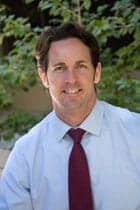 Brian Clyne, MD
Brian Clyne, MD
Warren Alpert Medical School of Brown University
Dr. Clyne (AΩA, Warren Alpert Medical School of Brown University, 2016, Alumnus) serves as Vice Chair for Education in the Department of Emergency Medicine at The Alpert Medical School of Brown University. He completed his training in Emergency Medicine at the University of Maryland Medical Center/Shock Trauma Center where he served as chief resident. Following residency, Dr. Clyne returned to Brown where he has served in numerous educational roles and earned recognition for teaching excellence. He was the director of medical student education in Emergency Medicine prior to serving as residency program director from 2005-2013.
As Vice Chair, Dr. Clyne oversees and supports educational programs across the continuum of learners from undergraduates to faculty. He is co-director of the Medical Education Research Fellowship at Brown, and a founding member of the AMS Program in Educational Faculty Development. He has designed a master’s level leadership course for medical students at Alpert Medical School.
 Nora Gimpel, MD
Nora Gimpel, MD
University of Texas Southwestern Medical Center at Dallas
Dr. Gimepl (AΩA, University of Texas Southwestern Medical Center at Dallas, 2016, Faculty) is Chief of the Community Health Section at University of Texas Southwestern Medical Center at Dallas. In the past 10 years, she has developed an infrastructure that provides trainees the opportunity to learn the principles of population medicine, community-based disease prevention, care of the underserved, and culturally appropriate approaches to health problems.
She has been directing numerous training programs to provide innovative service learning experiences to medical students, residents, fellows, and faculty to help improve the health of the underserved communities in Dallas. She has mentored pre- and postdoctoral trainees in community action research. accomplishments of this work have been published and presented nationally and internationally. She directs the four components Community Action Research Track (CART), Community Health Fellowship Program (CHFP), Community Action Research Experience (CARE), and Community Medicine Fellowship of the community action research training pipeline developed at the Division of Community Medicine in the Department of Family and Community Medicine. She has developed strong collaborative relationships throughout the academic and surrounding Dallas community. More than 30 community partners have participated in service learning opportunities with UTSW medical students, residents and fellows. She believes that interprofessional collaboration in education and practice will improve the quality of care provided, and will bring an opportunity to creatively address health disparities.
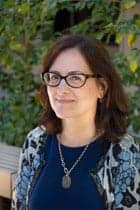 Susan Lane, MD
Susan Lane, MD
Stony Brook University School of Medicine
Dr. Lane (AΩA, Stony Brook University School of Medicine, 2011, Faculty) serves as program director of the Internal Medicine Residency Program, and Vice Chair of Education for the Department of Medicine at Stony Brook Medicine in Long Island, New York. She received her B.A. from Amherst College in 1985, her M.D. from the University of Connecticut School of Medicine in 1993, and completed her internal medicine residency at Strong Memorial Hospital of the University of Rochester in 1996. Dr. Lane has practiced general internal medicine continuously since graduation, and has held leadership positions along the continuum of medical education, including clinic preceptor, clerkship director, program director, and vice chair of education. In addition to her role as a clinician educator, Dr. Lane has been a strong advocate for primary care medicine. She serves as Chair of the Advocacy Committee for the Alliance of Academic Internal Medicine (AAIM) and Co-Chair of the AAIM GME Funding and Physician Work Force Task Force. Dr. Lane is a Fellow of the American College of Physicians (ACP), serves as the AAIM liaison to the ACP’s Health and Public Policy Committee, and is a regular participant in the annual ACP Leadership Day on Capitol Hill.
During her medical school training Dr. Lane had the unique opportunity to spend eight weeks in rural Haiti educating young women about safe birth practices. The experience of direct patient care in a resource-poor area had a lasting impact on her career choice as a primary care physician and her life-long dedication to populations with limited access to primary care. Last year, Dr. Lane was selected to mentor a Haitian clinician educator in a program jointly sponsored by AAIM and Partners for Health. Over email and skype, Dr. Lane and her mentee worked together to help build a curriculum for the residency program in Haiti, culminating in the clinician educator’s appointment as residency program director.
The fellows will each receive $25,000 to be used fund their respective leadership development projects. They will also receive coaching and mentorship from nationally renowned leaders in medicine to help them exemplify the qualities of leading from within, AΩA’s professional values, and the concepts of servant leadership.
Previous fellows have attributed this award to preparing them for career advancements, taking on more responsibility, and better advocating for their needs.
“I am very impressed with the quality of this year’s fellows,” says Richard L. Byyny, MD, FACP, Executive Director of Alpha Omega Alpha. “The AΩA Fellow in Leadership Award is a unique opportunity to support emerging physician leaders in their careers and give them new leadership opportunities in medicine. This group of fellows joins our six previous AOA Fellows in Leadership in becoming the next generation of leaders in medicine.”
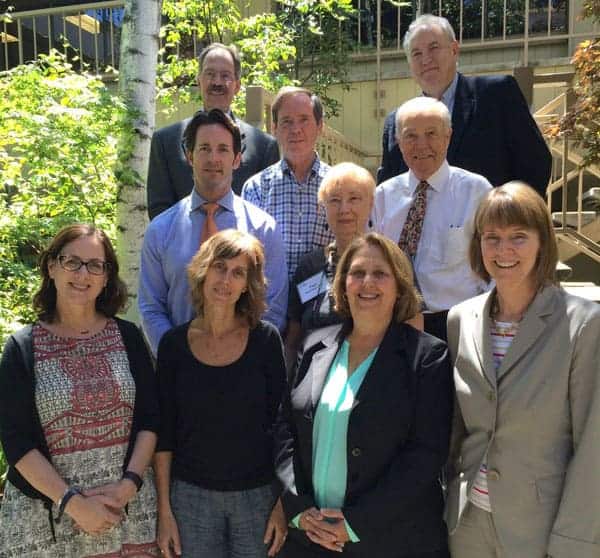 Front row, L to R: Susan Lane, MD; Nora Gimpel, MD; Dee Martinez; Kathi Becker. Middle cluster: Brian Clyne, MD; Alan Robinson, MD; Page Morahan, PhD; Richard Byyny, MD; Back row: Wiley Souba, MD; John Tooker, MD
Front row, L to R: Susan Lane, MD; Nora Gimpel, MD; Dee Martinez; Kathi Becker. Middle cluster: Brian Clyne, MD; Alan Robinson, MD; Page Morahan, PhD; Richard Byyny, MD; Back row: Wiley Souba, MD; John Tooker, MD
Alpha Omega Alpha Honor Medical Society (AΩA)
Since its founding in 1902, Alpha Omega Alpha Honor Medical Society has recognized and advocated for excellence in scholarship, demonstrated professionalism, and the growth of physician leadership in the profession of medicine. Through 130 active chapters in the United States and Lebanon, more than 3,600 new members are inducted into the society each year. More than 55 Nobel Prize winners are members of Alpha Omega Alpha, as well as 11 of the 19 United States Surgeons General, including Dr. Vivek Murthy. Nearly 75% of deans of U.S. medical schools are members of AΩA. Alpha Omega Alpha annually grants more than $1.5 million in programs and awards to impact medical students, residents, teachers, and community physicians.
2015
Leadership in medicine, medical education, and health care is more complex in the twenty-first century than ever before. Escalating costs, unequal access, less than ideal outcomes, and political challenges facing health care legislation have contributed to an unprecedented level of uncertainty in the delivery of health care and medical education. The medical profession and the country are in need of leadership that is inspiring, insightful, engaging, and humble—leadership that both understands and represents the needs of patients, physicians, and medical educators and trainees. Because of their unique knowledge of the practice of medicine and understanding of medicine’s core professional values, physicians are ideally suited to serve as leaders in this period of change. The integral parts of the professional life of a physician are the values affirmed in the Medical Professionalism Charter that emphasizes the principles of patient welfare, patient autonomy, and social justice (http://annals.org/article.aspx?articleid=474090).
The AΩA Fellow in Leadership Award recognizes and supports the further development of outstanding leaders exemplifying the qualities of leading from within, AΩA’s professional values, the concepts of servant leadership
The five essential components of the AΩA Fellow in Leadership Award are 1) self-examination, the “inward journey,” leading from within; 2) a structured curriculum focused on topics related to leadership, including an understanding of the relationship between leadership and management; 3) mentors and mentoring; 4) experiential learning to broaden the perspective and understanding of leadership as it relates to medicine and health care; and 5) team-based learning and developing communities of practice.
We are pleased to announce the 2015 AΩA Fellows in Leadership, each of whom received a $25,000 award to be used for further development as future leaders:
- Cynthia Arndell, MD, BSN, FACP—Associate Professor in Internal Medicine at the University of New Mexico Health Sciences Center
- Ronald Robinson, MD, MPH—Medical Director of Surgical Services at Centura Health, Avista Adventist Hospital in Louisville, Colorado
- Elizabeth J. Warner, MD, FACP—Medical Director of Continuous Improvement Support at Bronson Healthcare Group in Kalamazoo, Michigan
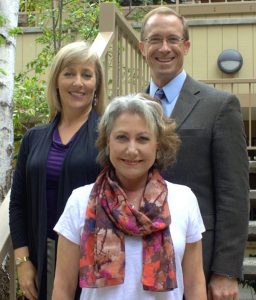
Left to right: 2015 Fellows in Leadership Elizabeth Warner,
Cynthia Arndell, and Ronald Robinson.
Fellows and members of the AΩA Board of Directors Committee on Leadership met at AΩA’s national office in Menlo Park, California, for a four-day meeting that included a two-day orientation session during which fellows and committee members learned about the background, development, goals, and principles of the award; discussed fellows’ goals for the fellowship; worked on refining the fellows’ projects; and got to know each other. The final two days included the course The Science and Practice of Leading Yourself, led by AΩA Board of Directors member Dr. Wiley Souba of the Geisel School of Medicine at Dartmouth.
Attending the meeting were:
- 2015 Fellow in Leadership Cynthia Arndell, MD, BSN, FACP
- AΩA Executive Director Richard L. Byyny, MD, FACP
- AΩA Leadership Committee Chair Eve Higginbotham, SM, MD
- AΩA Leadership Committee Member Page Morahan, PhD
- AΩA Board of Directors President Douglas Paauw, MD, MACP
- AΩA Leadership Committee Member Alan Robinson, MD
- 2015 Fellow in Leadership Ronald Robinson, MD, MPH
- AΩA Leadership Committee Member Wiley “Chip” Souba, MD, DSc, MBA
- AΩA Leadership Committee Member John Tooker, MD, MBA, MACP
- 2015 Fellow in Leadership Elizabeth Warner, MD, FACP
- AΩA Leadership Committee Member Don Wilson, MD, MACP
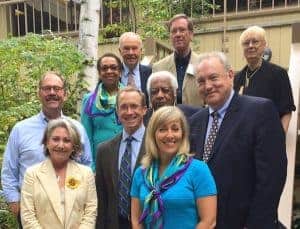 Orientation participants, left to right: Chip Souba, Cindy Arndell, Eve Higginbotham, Ron Robinson, Dick Byyny, Don Wilson, Elizabeth Warner, Alan Robinson, John Tooker, and Page Morahan.
Orientation participants, left to right: Chip Souba, Cindy Arndell, Eve Higginbotham, Ron Robinson, Dick Byyny, Don Wilson, Elizabeth Warner, Alan Robinson, John Tooker, and Page Morahan.
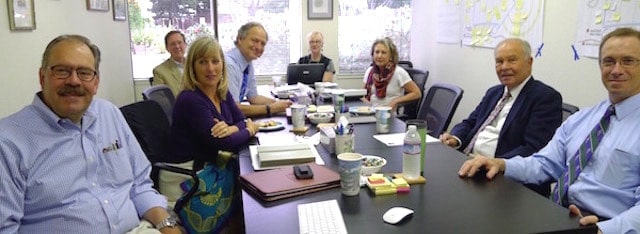 Course participants, “The Science and Practice of Leading Yourself,” left to right: Chip Souba, Alan Robinson, Elizabeth Warner, Doug Paauw, Page Morahan, Cindy Arndell, Dick Byyny, Ron Robinson.
Course participants, “The Science and Practice of Leading Yourself,” left to right: Chip Souba, Alan Robinson, Elizabeth Warner, Doug Paauw, Page Morahan, Cindy Arndell, Dick Byyny, Ron Robinson.
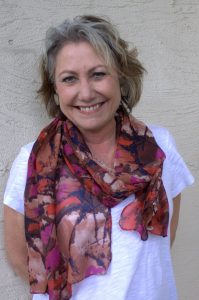 Cynthia Arndell, MD, BSN, FACP
Cynthia Arndell, MD, BSN, FACP
Associate Professor, Internal Medicine, University of New Mexico Health Sciences Center, Albuquerque, New Mexico
As an Associate Professor at the University Of New Mexico Health Sciences Center (HSC), Dr. Cynthia Arndell has been able to fulfill her passion for making a difference in the lives of marginalized individuals and communities. Through extensively researching best practice models and networking across disciplines, she has taken the lead role in the development and integration of the medical curriculum that addresses social accountability. Her successes include the following required educational activities: 1) the first two-week course, Health Equity: Introduction to Population Health which introduces all incoming medical and physician assistant students to social determinants of health, 2) the first-year medical and physician assistant student interviews with homeless populations, 3) third-year medical student post- discharge home visits with pharmacy students which address the challenges of transitions of care in patients experiencing low health literacy and scarcity of resources, and 4) the fourth-year medical student Comprehensive Ambulatory Care rotation which advances student skills in Interprofessional collaboration to address the needs of vulnerable populations. Additionally, in collaboration with faculty across disciplines and community partners, she developed and implemented the senior medical and pharmacy student Street Outreach and Respite four-week elective. Dr. Arndell serves as the faculty mentor for overseeing all medical student-led volunteer outreach clinics for the homeless and was the champion in developing the Interprofessional Student Clinic for Albuquerque Homeless Men’s Shelter.
Dr. Arndell’s curricular innovations have gained national and international recognition resulting in numerous prestigious awards and guest speaker invitations. Her experience in interprofessional education curriculum development has led institutional leadership to appoint her as the University of New Mexico School of Medicine Interprofessional Coordinator. She has, subsequently, taken a lead role in securing the support of HSC deans across disciplines to agree upon the implementation of an interprofessional longitudinal community-engaged curriculum for all HSC students.
Integrating Interprofessional Education (IPE) into an Academic Health Sciences Institution—What are the key challenges we face in faculty engagement?—As a native New Mexican living and working as a health professional in a state that ranks forty-eighth in the nation for poverty, I have witnessed, firsthand, the impact of social determinants on population health; i.e., how the array of social, economic, political, and built environments shape individual and societal health resulting in gross inequities between and within populations. As a nurse, physician, and community volunteer, I have served our state’s communities for over thirty-five years. And I find myself struggling more and more with the inability of our fragmented healthcare systems to meet the needs of our populations, particularly those that are the sickest and most marginalized. As a faculty member at University of New Mexico Health Sciences Center, I have had the privilege of developing, implementing, and teaching the medical school curriculum that addresses the social determinants of health. A coordinated team of multiple disciplines is necessary to improve the health outcomes of individuals and their communities. As a result, I have collaborated with professions both within and outside of our health sciences institution to begin developing interprofessional educational opportunities for our students. Although the University of New Mexico Health Sciences Center has given top priority to the integration of interprofessional education, our institution faces similar challenges to other academic centers in securing faculty buy-in and interest.
In recognition of the crucial role faculty engagement plays in successful interprofessional education implementation, my scholarly project will focus on the development of a cross-disciplinary strategic plan for grounding institutional faculty development and commitment.
I am confident that this fellowship will serve to advance my work in continuing to align the education of our future healthcare workforce with our societal contract to improve the health of all.
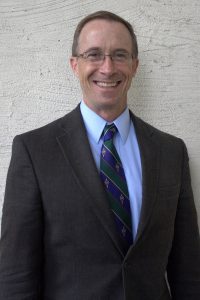 Ronald Robinson, MD, MPH
Ronald Robinson, MD, MPH
Medical Director of Surgical Services, Centura Health, Avista Adventist Hospital, Louisville, Colorado
Dr. Ronald Robinson currently serves as managing partner of High Plains Anesthesia Consultants, and as medical director of surgical services at Avista Adventist Hospital, a Denver-area community hospital. He received his MD and MPH from the University of Texas Medical School at Houston in 1993, and completed his anesthesiology residency at UT Houston in 1997. He has practiced anesthesiology continuously since graduation in underserved rural and community hospital settings.
In addition to private practice, Dr. Robinson has served as a flight surgeon for both NASA’s Johnson Space Center and the Texas Air National Guard. He has educated medical students and residents as clinical faculty at the University of Texas at Houston, and Lake Erie College of Osteopathic Medicine at Bradenton. He has participated actively in research, and is published in the fields of physics, aviation medicine, and pain medicine. Dr. Robinson has also owned and operated multiple small businesses involving aviation, finance, and real estate.
Concurrent with his clinical practice, Dr. Robinson is pursuing an MBA through the University of North Carolina’s Kenan-Flagler Business School. In addition to his experience in business and medicine, Dr. Robinson is currently studying leadership with the Greenleaf Center for Servant Leadership, and anticipates completion of their certificate program in June 2015.
Charting the course for servant leaders in community practice—My project will target one of the thorniest issues in modern medical care: the rapidly increasing cost of invasive procedures, which is largely unaccompanied by an improvement in outcomes. The focus of the project will be reducing variability in clinical practice, and optimizing resource utilization, in laparoscopic hysterectomies performed at Avista Adventist Hospital.
Women’s services are a critical component of the care that is delivered at our institution, and we provide a wide spectrum of services from obstetrics to advanced urogynecology. Analysis of the service line, however, reveals extensive variability in clinical practice and resource utilization in laparoscopic hysterectomies performed at our institution relative to comparable institutions, resulting in underperformance of the service line as a whole. The goal of this project is to reduce variability, implement best practices, and improve the performance of the service line to a level exceeding that of our competitor institutions.
This project provides the opportunity to apply traditional management techniques, such as revenue cycle analysis and supply chain optimization, within a collaborative servant-leadership framework. Success in this project requires developing a team of physicians, nurses, and administrators that can meld the various stakeholders’ viewpoints, and deconflict competing priorities, to increase the performance of the service line while maintaining a community of care centered on the fundamentals of physician and patient autonomy, and state-of-the-art clinical practice.
Successful completion of this project will demonstrate the cooperation that is possible between managers and clinicians under a servant-leader model. Application of the servant-leader model in this context will demonstrate that high quality care can be provided in a cost-constrained environment, utilizing modern medical and management practices, without increasing governmental regulation. The project will provide valuable experience in team-based learning for all participants, and it will facilitate similar projects in other service lines at Avista. It is my hope that success in this project will chart the course for other institutions that wish to follow suit.
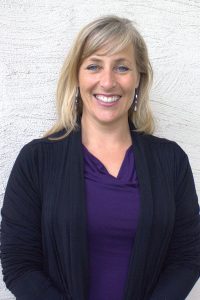 Elizabeth J. Warner, MD, FACP
Elizabeth J. Warner, MD, FACP
Medical Director, Continuous Improvement Support, Bronson Healthcare Group, Kalamazoo, Michigan
Dr. Elizabeth J. Warner currently serves as Medical Director of Continuous Improvement Support, Bronson Healthcare Group, Kalamazoo, MI. Upon completion of her internal medicine residency in 2001, she developed as a primary care internist, where she practiced with passion and purpose for the health of her patients. This passion guided her to a leadership role as Primary Care Medical Director from 2012-2014.
Born and raised in Cedar Rapids, Iowa, her higher education began in the University of Minnesota, Minneapolis, MN where she graduated Summa Cum Laude with a Bachelor of Arts in International Relations, and a French minor in 1994. She was inducted into Phi Beta Kappa for her efforts. Dr. Warner received her Doctorate of Medicine from Michigan State University, College of Human Medicine in 1998, where she was honored with membership into AOA, and completed her Internal Medicine residency at the Kalamazoo Center for Medical Studies (KCMS).
Her formal and informal training are ongoing. Active in the Michigan Chapter of ACP, she received LEAD certification from ACP (2010), and Fellowship status with ACP (2009). She is actively pursuing her Certified Physician Executive certification with educational guidance from the American Association of Physician Leaders, of which she is a member. She received lean certification with University of Michigan (2/2014) and continues to develop this practice.
Her strengths include public speaking on a wide range of topics from Obesity, Leadership and Teamwork skills, Motivational Interviewing, to Rediscovering Personal Sense of Purpose in Medicine. She speaks about Balance, Spiritualty, and Resilience, even as she strives and struggles to achieve it for herself. As an involved community member, parent and human, Elizabeth is inspired to practice the principles of lean thinking, including respect for people, continuous improvement, and leading with humility, throughout all aspects of her life.
Transformational Lean Management System—As Medical Director of Continuous Improvement Support at Bronson Healthcare Group, I serve as physician champion advancing the work of lean tools and principle-based organizational excellence. This work is anchored in the principles of Respect for People and Continuous Improvement with the explicit intent of improving the value and sustainability of the care we deliver to the patient. Bronson’s definition of lean is taken from the work of Jeffery Liker (Developing Lean Leaders at All Levels, LLI, 2014) and is as follows: a strategy for operational excellence based on clearly defined values to engage people in continuously improving Safety, Morale, Quality, Cost and Productivity. With the uncertainties and external pressures in the American health care system, and changing reimbursement models, we need clarity of vision, constancy of purpose, to develop reliable structures and nimble pathways to identify problems. Health care systems need to problem solve them as close to the work as possible, and to anchor these behaviors in the principles which drive operational excellence.
Our organization has doubled in size over the past five years, and we are experiencing the “growing pains” of these mergers and acquisitions. This is challenging us to consistently deliver on the value proposition of high quality patient experiences and lowest cost. I hypothesize that lean problem solving discipline and scientific thinking will help us experiment our way to an improved patient care, and sustainable systems for caregivers. Our lean work to date has yielded some great pockets of success, and now we need to develop aligned systems to build upon this work. We have identified critical ideal state components of our organization’s future, including:
- Building integrated and engaged healthcare teams across the continuum of care.
- Developing a culture that embraces the idea that improving the work is the work.
- Consistently showing respect by developing our people.
- Celebrating finding problems and applying disciplined rigor with simple tools to close these gaps.
- Cultivating leaders who embrace personal growth and learn to manage by process rather than managing by objective.
I propose to develop and deploy a principle-based Management System founded in lean thinking and grounded by the pillars of Continuous Improvement and Respect for People. This includes a leadership system, built to inspire and provide clarity to the frontline worker, as well as help leaders practice leading with humility, a delivery system intended to align the work in service to the patient, and to learn from the frontline workers, and an improvement system build to deliberately empower & develop our people to deliver and improve patient care. Conceptually developed from the work of the Toyota Production System, and further informed by the trailblazing work of Virginia Mason, ThedaCare, and others, I will partner with colleagues throughout my organization to understand, develop and practice a new way of seeing, doing and improving the work of patient care. The leadership, delivery and improvement systems will reinforce behaviors which get us closer to the ideal state components listed above.
2014
Leadership has long been a core value of Alpha Omega Alpha Honor Medical Society and is one of its criteria for membership. Because of their unique knowledge in medicine and in their understanding of medicine’s core professional values, physicians are ideally suited to serve as leaders in these areas. Their professional experiences in serving and caring for people and working with teams in the health professions provide a solid foundation for leadership. AΩA believes that the best most sustainable leadership for medicine must be grounded in the professional values of integrity and honesty, loyalty and duty, respect and care, service, and communication.
The AΩA Fellow in Leadership Award recognizes and supports further development of outstanding leaders exemplifying the qualities of leading from within, the society’s professional values, and the concepts of servant leadership.
The five essential components of the AΩA Fellow in Leadership Award are: 1) Self-examination, the “inward journey,” leading from within; 2) a structured curriculum focused on topics related to leadership, including an understanding of the relationship between leadership and management; 3) mentors and mentoring; 4) experiential learning to broaden the perspective and understanding of leadership as it relates to medicine and health care; 5) team-based learning and developing communities of practice.
We are pleased to announce the 2014 AΩA Fellows in Leadership, each of whom received a $25,000 award to be used for further development as future leaders:
- Nathan E. Goldstein, MD—Interim Director, Palliative Care Program, Mount Sinai-Beth Israel Hospital
Lieutenant Colonel - Joshua D. Hartzell, MD—Associate Program Director, Internal Medicine Residency, Assistant Chief of Graduate Medical Education, Army Intern Director, Walter Reed National Military Medical Center
- Monica Vela, MD—Associate Professor of Medicine and Associate Dean for Multicultural Affairs, University of Chicago Pritzker School of Medicine
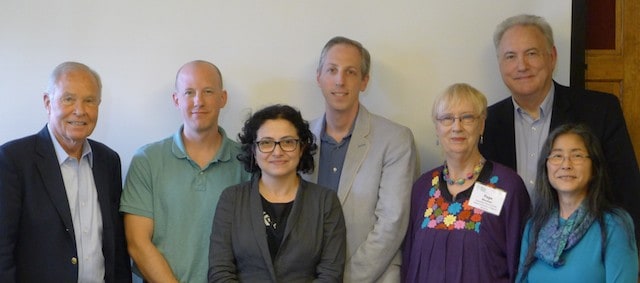
AΩA Fellow in Leadership Orientation participants: AΩA Executive Director Richard L. Byyny, MD; Fellow in Leadership Joshua D. Hartzell, MD; Fellow in Leadership Monica Vela, MD; Fellow in Leadership Nathan Goldstein, MD; Leadership Committee member Page Morahan, PhD; AΩA President John Tooker, MD, MBA; Leadership Program Administrator Debbie Lancaster. Missing is Committee member Donald E. Wilson, MD.
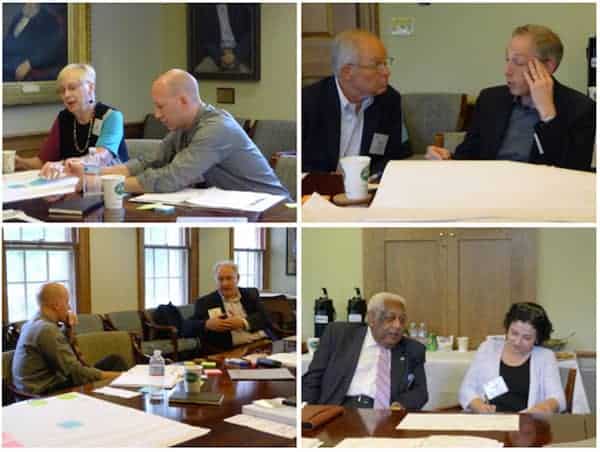
Clockwise from top left: Page Morahan and Joshua Hartzell, Richard Byyny and Nathan Goldstein, Donald Wilson and Monica Vela, Joshua Hartzell and John Tooker.
Fellows and members of the AΩA Board of Directors Committee on Leadership met in Hanover, New Hampshire for a two-day orientation meeting on July 8-9, 2014, in which fellows were helped to think more deeply about their projects and their leadership opportunities. Following the orientation meeting, fellows and some committee members attended the Geisel School of Medicine Leadership course, The Science and Practice of Leading Yourself.
Nathan E. Goldstein, MD
Associate Professor of Medicine, Icahn School of Medicine at Mount Sinai
Dr. Goldstein is an Associate Professor in the Brookdale Department of Geriatrics and Palliative Medicine at the Icahn School of Medicine at Mount Sinai. His areas of expertise include pain in older adults, palliative care, and the use of advanced technologies for patients near the end of life. Dr. Goldstein is a clinician investigator whose work examines ways to improve patient-physician communication in patients with advanced heart failure. He has published both on his research as well as a broad range of communication issues in palliative medicine in both general medicine and specialty journals. He lectures extensively across the country on palliative care.
Dr. Goldstein is an attending physician on Mount Sinai’s inpatient palliative care consult service, and is a clinician researcher at the James J. Peters Veterans Affairs Medical Center in Bronx New York. He was recently promoted to the position of interim Director of the Palliative Care Program at Mount Sinai-Beth Israel Hospital. He graduated magna cum laude with a BA in Biology from Carleton College in Northfield, MN where he was elected to Phi Beta Kappa. He attended the Mount Sinai School of Medicine for medical school where he was elected to Alpha Omega Alpha. He completed his training in internal medicine at the Mount Sinai Medical Center, followed by health services research training in the Robert Wood Johnson Clinical Scholars Program at the Yale University School of Medicine. He then returned to Mount Sinai to complete a clinical geriatrics fellowship, and subsequently joined the faculty in 2004.
Leading and Redesigning an Academic Palliative Medicine Program—Palliative care is interdisciplinary care that aims to relive suffering and improve the quality of life for patients and their families; it is provided at the same time as life-sustaining or curative treatments. As a palliative care physician and geriatrician in the Brookdale Department of Geriatrics and Palliative Medicine at the Icahn School of Medicine at Mount Sinai, I am deeply dedicated to providing high-quality palliative care for patients and their families. I have recently been appointed the Director of the Palliative Care Program at Mount Sinai-Beth Israel, an 856-bed teaching hospital founded in 1889 on Manhattan’s Lower East Side. My new appointment is a result of a recent merger of hospital systems and the staffing changes associated with the addition of Beth Israel to the Mount Sinai Health System. In this position, I am being charged with redesigning the organizational structure of the division, creating a strategic plan and business case for the new service, and developing metrics to track the quality of care delivered by the palliative care team. I will use the ΑΩΑ award to develop skills to help me lead this new division through this period of change and transition. I will be reporting directly to the president of the hospital as well as the director of the palliative care institute for the Mount Sinai health system. In addition to being mentored by both of these individuals, I will undertake a program of formal coursework and work with an executive healthcare coach.
Joshua Hartzell, MD
Associate Program Director, Internal Medicine Residency
Assistant Chief of Graduate Medical Education
Army Intern Director, Walter Reed National Military Medical Center
Lieutenant Colonel Hartzell was born and raised in Pennsylvania and then went to Duquesne University where he was one of the Distinguished Military Graduates of the Army ROTC program. Dr. Hartzell then attended the Uniformed Services University (USU) School of Medicine. Following medical school, Dr. Hartzell went to Walter Reed Army Medical Center for his residency in Internal Medicine. He was selected as Chief Resident and served in that position until starting his Infectious Diseases Fellowship in 2006. He is currently board certified in Internal Medicine and Infectious Diseases and holds the Certificate of Knowledge in Clinical Tropical Medicine and Travelers’ Health from the American Society of Tropical Medicine and Hygiene. He is a graduate of the Stanford Faculty Development Facilitator Course. Dr. Hartzell currently serves as the Associate Program Director for the Internal Medicine Residency, Assistant Chief of Graduate Medical Education (GME), and Army Intern Director at Walter Reed National Military Medical Center (WRNMMC). Dr. Hartzell’s current interests include mentorship, teaching, and leader development.
Dr. Hartzell has 36 peer reviewed publications, 4 letters to the editor, 1 book chapter, and 18 abstracts. Dr. Hartzell has been an invited speaker or guest lecturer 20 times at different regional, national, and international venues. Dr. Hartzell has served as a reviewer for 19 different scientific journals including Clinical Infectious Diseases and Lancet Infectious Diseases. He currently holds the rank of Associate Professor at the Uniformed Services University of the Health Sciences.
Moving Beyond Accidental Leadership: A Leadership Curriculum Proposal—Few medical schools and graduate medical education (GME) programs including the military provide explicit training on the knowledge, skills, and attitudes necessary to be an effective physician leader. Rather, most leaders develop through what has been coined “accidental leadership.” My proposal is to create a leadership curriculum for the Graduate Medical Education Programs at Walter Reed National Military Medical Center (WRNMMC) and beyond. Instilling these concepts and skills into physicians during residency or earlier will create better leaders and develop a cadre of physicians who are more likely to pursue careers in leadership or, at a minimum, to be more adept at handling the day to day leadership moments faced by physicians. I am incredibly fortunate to have a team of leaders who are supportive of this proposal and will be providing personal mentoring throughout the year. The leadership and vision of Colonel Michael Nelson (Director of Education, Training, and Research at WRNMMC), Colonel Cliff Yu (Chief of GME at WRNMMC), Arthur Kellermann (Dean of the Uniformed Services University [USU]), Lieutenant General (Retired) Eric Schoomaker (former Army Surgeon General, current Scholar-in-Residence and Distinguished Professor of Military and Emergency Medicine at USU), and Colonel Pat O’Malley (AOA Councilor) have been instrumental in creating momentum for this project. Just as important has been the response of the trainees. They are eager to solidify their skills as leaders, and we hope that this curriculum will meet their needs. As medical educators and leaders, we must continually evolve and make it a priority to develop the next generation of leaders. The goal of our team is to create a curriculum that enhances the leadership skills of a generation of military physicians.
Monica Vela, MD
Associate Professor of Medicine and Associate Dean for Multicultural Affairs
University of Chicago Pritzker School of Medicine
Dr. Vela received her MD degree in 1993 at the University of Chicago Pritzker School of Medicine, completed internship in a dual Internal Medicine and Pediatrics program and completed residency in Internal Medicine at the University of Chicago in 1996. She provides primary care for patients at UCM’s Primary Care Group. She has been teaching the nationally recognized course, Health Disparities: Advocacy and Equity since 2006. She directs a summer enrichment program for under-represented minority students and also directs the minority visiting clerkship program for visiting senior students. She has served as the Associate Vice Chair for Diversity within the Department of Medicine at the University of Chicago Medicine since 2006 and the Associate Dean for Multicultural Affairs at the Pritzker School of Medicine since 2011. In 2011, she was award the ACP’s National Award for Diversity and Access to Care and in 2014 she was awarded the Society of General Internal Medicine’s Nickens Award for Diversity and Minority Health.
Promoting Diversity in the U.S. Physician Population—Promoting the diversity of the U.S. physician population is an important step in addressing health and health care disparities for minority and underserved populations. Multiple studies have shown that under-represented minority (URM) physicians are more likely to provide care for minority, underserved, and indigent populations. Under-representation of minority medical students is problematic because medical students value diversity in their classmates, and diversity improves all students’ academic experiences and their abilities to work with patients from differing backgrounds. Medical schools vie for the same limited number of qualified minority premedical students. Medical schools have responded to this challenge by developing a pipeline of students supported by a variety of summer enrichment experiences.
The lack of published studies on existing programs significantly limits the ability for others to reproduce successful pipeline elements and to share process measures. A study has yet to review the practices of these unpublished programs for curricular content, teaching modalities, or assessment practices. My project has two specific aims:
SPECIFIC AIM 1. To develop and deliver a survey of the minority medical students across the United States to understand a) how many of them participated in pipeline programs and b) explore which intervention practices have impacted either their admission to medical school or their success in navigating medical school.
SPECIFIC AIM 2. To develop and deliver in-depth interviews of pipeline program directors at U. S. medical schools in an effort to explore the types and scope of pipeline program interventions within academic centers and the perceived barriers and facilitators of the interventions’ success. We will explore1) those interventions that address the assets believed to promote minority student success in the process of applying to and succeeding in medical school and 2) the tools and instruments being used to assess pipeline intervention strategies.

